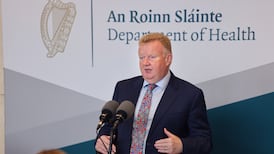The intensive care unit (ICU) in Dublin’s Mater Hospital is full, with some patients being moved to the high dependency unit, a senior doctor there has said. The hospital’s Director of Critical Care Medicine, Dr Cormac O’Loughlin, said most of those in the ICU beds are Covid-19 patients adding that the biggest challenge in the treatment of them will be staffing problems.
Dr O'Loughlin told RTÉ radio's Morning Ireland that the hospital has plans to move patients into the high dependency ward where there are another 18 beds and, when that becomes full, staff have set up ventilators on other wards.
“To run an intensive care bed requires a huge amount of medical staff, in particular nursing staff. We have a standard of care which is one-to-one nursing so every patient has a dedicated nurse 24 hours a day to run our normal standards of care for intensive care in Ireland.
“That would be threatened, that could be diluted if we stretch beyond the numbers we’re comfortable with, so that’s a bit of an unknown yet, but we have plans - all we can do is our best.
“There are 18 beds in our standard ICU, we have been running 17-18 beds for the last few years, between the mix we are full, we have also had to move some of our sicker patients out of ICU and into the high dependency for ventilation - that happened just before the weekend, we’re lucky that we had a lead in time, to allow us shut down the normal activity of the hospital and free up a lot of space capacity, which has allowed us to build plans for surge activity.”
Dr O'Loughlin, who is president of the Intensive Care Society of Ireland, added that he is already beginning to get referrals from the wards, where some patients are beginning to deteriorate. But he pointed out that some patients have done very well in the ICU and have been discharged back to the ward.
“These patients are very sick, this is a devastating lung injury, the ones that require admission to intensive care - some are lucky enough that they have the physiological reserve, the strength to fight this off on their own immune system, without intervention from intensive care.
“Unfortunately some are not so lucky and the process that undermines the pneumonia continues to worsen while they’re in intensive care and it goes back to the original problem - there is no definitive treatment for this, there’s no anti-viral agent that has been proven to work, there’s no other agent that we can give them, as opposed to a bacterial pneumonia - we give them antibiotics and it helps.
“All we’re doing is giving support, we’re doing organ support, we’re supporting lungs, kidneys etc and we’re giving the patient a chance to recover. We’re trying to minimise complications - if they recover then that’s fantastic and it makes everyone feel great about the interventions that we’re using, but there’s certainly the fact that some patients are not recovering and some have passed away in intensive care. It’s very hard for us to do more than support them as best we can.”
Dr O’Loughlin said the hospital will do everything it can for families in this very difficult time and offers the opportunity for family members to come in and wear personal protective equipment to be with their loved ones who will not survive Covid-19. Many families had been reluctant to do this and he said that staff will do all they can to be with a patient when they die.
“It’s extraordinarily difficult we’ve never seen anything like this before - we have a very well established end of life pathway in the hospital in intensive care and a lot of that has gone out the window because of this disease.
“As best we can we will do everything we can to help them to be with them in this very difficult time. There’s huge challenge around us, there’s a lot of fear in the community, there’s a lot of fear in the intensive care community, among medical staff, about this disease.
"We're seeing a lot of our own staff getting sick, that's been reflected throughout the world, it's extraordinarily difficult, our job is to look after patients and by extension their families and we will do everything we can to help them in this time." - Additional reporting PA









